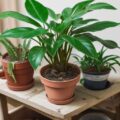Introduction
As the colder months approach, many gardening enthusiasts look for ways to continue their hobby indoors. One of the best ways to enjoy gardening year-round is by growing herbs indoors. Not only do they add a touch of greenery to your home, but they also provide fresh ingredients for your meals. In this article, we will explore the best herbs to grow indoors during fall and winter.
Why Grow Herbs Indoors?
Growing herbs indoors offers numerous benefits. Firstly, it allows you to have fresh herbs at your fingertips, which can significantly enhance your cooking. Secondly, indoor herbs can improve air quality and add a pleasant aroma to your home. Lastly, indoor gardening can be a therapeutic activity, helping to reduce stress and improve mental well-being.
Top Herbs to Grow Indoors
1. Basil
Basil is a popular herb known for its fragrant leaves and versatility in cooking. It thrives in warm, sunny locations, making it an excellent choice for indoor gardening during the colder months. Place your basil plant near a south-facing window and water it regularly to keep the soil moist.
2. Mint
Mint is a hardy herb that can grow well indoors, even during fall and winter. It prefers partial sunlight and can tolerate lower light levels, making it suitable for indoor conditions. Mint is perfect for adding a refreshing flavor to teas, desserts, and savory dishes.
3. Thyme
Thyme is a resilient herb that can withstand colder temperatures, making it ideal for indoor growth during fall and winter. It requires plenty of sunlight, so place it in a bright spot in your home. Thyme is a versatile herb that pairs well with various dishes, from soups to roasted meats.
4. Rosemary
Rosemary is a woody herb that thrives indoors with proper care. It prefers bright light and well-drained soil. Rosemary’s aromatic leaves can be used to flavor meats, potatoes, and bread, making it a valuable addition to your indoor herb garden.
5. Chives
Chives are easy to grow indoors and require minimal care. They need bright light, so a sunny windowsill is ideal. Chives add a mild onion flavor to dishes and are perfect for garnishing soups, salads, and omelets.
Tips for Growing Herbs Indoors
- Light: Most herbs require at least 6 hours of sunlight each day. Place them near a south-facing window or use grow lights to supplement natural light.
- Watering: Keep the soil consistently moist but not waterlogged. Overwatering can lead to root rot, so ensure proper drainage.
- Humidity: Indoor air can be dry during fall and winter. Increase humidity by misting your herbs or placing a humidifier nearby.
- Soil: Use a well-draining potting mix to prevent water from sitting in the soil.
- Temperature: Most herbs prefer temperatures between 60-70°F (15-21°C). Avoid placing them near drafts or heat sources.
FAQ
1. Can I grow herbs indoors without natural sunlight?
Yes, you can grow herbs indoors without natural sunlight by using grow lights. LED grow lights are an excellent option as they provide the necessary light spectrum for plant growth.
2. How often should I water my indoor herbs?
Watering frequency depends on the type of herb and indoor conditions. Generally, water when the top inch of soil feels dry to the touch. Ensure pots have drainage holes to prevent waterlogging.
3. Can I use regular garden soil for indoor herbs?
No, regular garden soil is not suitable for indoor herbs as it may not drain well and can harbor pests. Use a high-quality potting mix designed for indoor plants.
4. How can I increase humidity for my indoor herbs?
Increase humidity by misting your herbs daily, using a humidity tray, or placing a humidifier nearby. Grouping plants together can also help create a more humid microenvironment.
5. What are some common pests for indoor herbs?
Common pests for indoor herbs include aphids, spider mites, and whiteflies. Regularly inspect your plants and use insecticidal soap or neem oil to treat infestations.
Conclusion
Growing herbs indoors during fall and winter is a rewarding way to continue gardening year-round. By choosing the right herbs and providing proper care, you can enjoy fresh, aromatic herbs even in the colder months. Start your indoor herb garden today and elevate your culinary creations with homegrown flavors.









